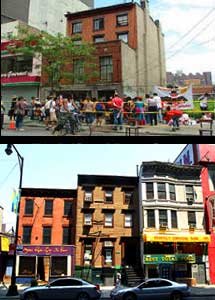
Today the subways were a mess, but this isn't a surprise. At least we're not Minneapolis, or at least it's not the ConEd explosion or a mine collapse.
While New York City is suffering from an ailing electrical and sewer infrastructure, we are on a building boom. Somehow, it's the priority to build endless luxury highrises and not fix potholes. How is this done?
For all of the megaprojects going up, one firm is responsible for most of the environmental studies: AKRF. This blog focuses on the Duffield Street homes, and we are committed to examining the credibility of AKRF's historical analysis.
You may ask, Who cares if AKRF screws up a historical analysis? The problem is that "historical resources" fall under the scope of environmental analysis, just like air pollution and waste water. So if AKRF lacks credibility in its historical analysis of Duffield, this raises questions about its traffic analysis.
And guess what? AKRF has been challenged in these other areas as well. So in honor of today's subway delays, here is a roundup of the links of shame:
- Consulting Firm Counts Both Developer and State As Clients on Atlantic Yards
- Columbia, ESDC-AKRF'd Up
- Revolving door: consultants AKRF and Habib worked for Ratner, then ESDC
- Time to call for a Probe into AKRF
- Manhattanville catch up
- Neutrality in Expansion at Columbia Is Questioned
- EDC Document Undermined by Local Reporter's Poetry
- Affidavit of Brian Ketcham -against- NYC Planning Commission, NYC Department of City Planning, IKEA, etc.
- Big in Yonkers
- Columbia's Lion Eyes
- AKRF lets client get off the hook for environmental clean-up
- Polluted lot next to Pepsi Site raises alarm
- And from AKRF's own website, the firm has been chosen to work on the World Trade Center Memorial and the IKEA Red Hook historic inventory


